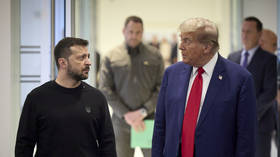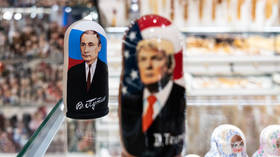This situation was always different from other Eastern European states – NATO just didn’t listen
It’s always easy to feel prescient in hindsight. I recall conversations from 15 or 20 years ago with Western interlocutors – who are now from unfriendly nations – on NATO expansion. The discussions always began in a relatively solemn manner. From our side, we politely asked, why are you doing this? The bloc was creeping ever closer to Russia’s borders, despite assurances that it was not an anti-Russian project. Their response was equally polite: What are you talking about? This is not directed against Russia. You should welcome having stable, democratic neighbors under NATO’s watchful eye.
After an hour, especially in informal settings, the real opinions began to surface. We warned, if you keep pushing, you’ll eventually reach Ukraine – and that is impossible. That is the red line.
The response? Come on! You objected to Poland and Hungary, and then you accepted it. You were angry about the Baltics, and nothing happened. What’s the difference with Ukraine? You’ll get used to it just like before.
Our objections – “No, you don’t understand! Ukraine is entirely different! This will not be the same; this will end badly!” – were met with amused smiles and condescending nods. We understand your concerns, but don’t worry, we’ll handle it, their expressions seemed to say.
A Foretold Crisis
We were right. They were wrong. But that fact does not make today’s reality any easier. The drive to pull Ukraine into NATO – an irresistible prize for the Atlantic bloc – was not some last-minute maneuver. US State Department documents from the 1990s show that Ukraine’s future membership in NATO was discussed even as the Soviet Union collapsed. It was not an immediate goal, but it was a logical consequence of the West’s Cold War victory. Any objections that contradicted this logic were dismissed outright.

The geostrategic miscalculations and arrogance that defined the so-called liberal world order are one thing. But what is more interesting is why Ukraine actually turned out to be very different. Why did those for whom Ukraine was just another chess piece in a grand geopolitical game fail to understand its unique position? Or did they understand but simply not care?
One interpretation is that the Ukrainian question is inseparable from the Russian question. The two are intertwined in a web of history, geography, religion, culture, and mythology. The struggle between inextricable symbiosis and desperate separation is not a contradiction – it is a dialectic. Every attempt to define one without the other results in instability. And each time outsiders tried to manipulate this balance for their own ends, the result was disastrous.
Western strategists have long obsessed over the Russian question, always looking for ways to minimize Moscow’s influence. The collapse of the USSR presented a unique opportunity to contain Russia’s resurgence. What followed was an attempt to reshape Eastern Europe to the West’s advantage, with no regard for the consequences.
A Fantasy of Nation-Building
All nation-building is a kind of fantasy – a process of self-invention. The land that is now Ukraine has always been a space where competing national myths collided. And historically, these clashes ended in bloodshed.
Each time, the conflict resulted in a temporary balance, which lasted for a historical cycle before collapsing again. What we are witnessing today is simply history repeating itself, but at an accelerated pace. Three decades after the emergence of modern Russia and Ukraine, we are reliving a condensed version of centuries of rivalry and realignment.

For years after 2014, Russia tried to convince the West that its perception of Ukraine was not a product of propaganda but rather a fundamentally different cultural and historical experience. Ukraine was not just another country that could be absorbed into NATO without consequence. But those arguments were brushed aside. Western officials would nod sympathetically, but their expressions made it clear: this is just another case of Russian imperial nostalgia. You’ll get over it.
The Road to War
The real tragedy is that this conflict was always going to be fought in Ukraine. Many had hoped to avoid direct military confrontation. Perhaps that would have been possible if the entire global system had not fallen into disorder. This war is not simply about Ukraine or even about Russia – it is the result of the broader collapse of the liberal world order.
As the post-Cold War international system became unstable, rising powers from different cultural and historical spheres – particularly in Asia – challenged Western dominance. The West responded by trying to reassert its ideological and military hegemony. Meanwhile, Russia, feeling cornered, saw itself pushed to its limits. The battlefield of this struggle became Ukraine.
Two geopolitical crises have now merged into one. On the one hand, there is the long-standing issue of European security, inherited from the Cold War. On the other, there is the question of Russian and Ukrainian self-determination, which predates the existence of modern nation-states. Either of these issues alone would be immensely complex. Together, they form an unsolvable puzzle.

The war that began in 2022 was intended to resolve the first issue: the question of European security. But as it progressed, the second issue – the deep and inescapable Russian-Ukrainian entanglement – became just as central.
No Winners in a Draw
The future of the world order will not be decided on the battlefields of Ukraine – unless, of course, events spiral into a nuclear catastrophe, a scenario that cannot be entirely ruled out. The world is much larger than the confrontation between Russia and the West. That is why the Global South and much of Asia remain largely indifferent to this conflict, watching from the sidelines as they pursue their own interests.
But for Russia, Ukraine, and the West, there is no escaping this battle. The outcome of this war will determine the future relationship between Russia and its neighbors, as well as Russia’s role in the international system. And one thing is certain: no one is interested in a draw.
This article was first published by Kommersant, and was translated and edited by the RT team.
